TOMODACHI BEYOND Tomorrow Global Leadership Academy 2015
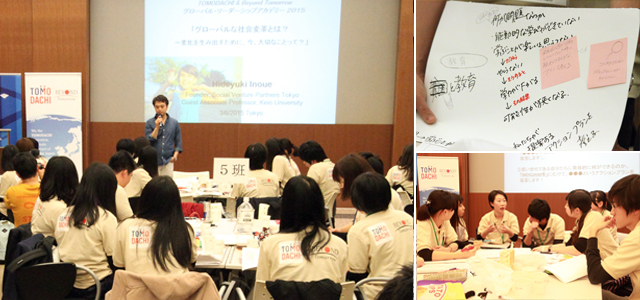
Summary
In March of 2015, the Global Fund for Education Assistance, with co-sponsorship with the TOMODACHI Initiative of the U.S.-Japan Council, held the TOMODACHI BEYOND Tomorrow Global Leadership Academy 2015. 70 high school and university students participated in this event, selected from those who went to the United States through the TOMODACHI Initiative’s programs. This event was an opportunity for these students to reflect on the roles they aim to fulfill in international society. Over the course of three days, the students participated in discussions and debates to create an action plan to eradicate extreme poverty, which is one of the United Nations’ Millennium Development Goals with a target deadline of 2015. The students developed this action plan by using their own experiences of going to the United States, as well as by taking in advice from leaders in various related fields. On the last day of the program, the students presented their action plans to leaders in diverse areas such as politics, government, business, media, and NGO, and the action plans were submitted as a proposal to the Assistant Secretary of the International Cooperation Bureau of the Ministry of Foreign Affairs of Japan.Goals
- For the students to reflect on what they learned through their trip to the United States, and how they can apply their learnings into action within the international community
- For the students to feel inspired to define their personal visions for the future, after interacting with leaders and older peers active in diverse fields
- For the students to fully apply themselves by engaging in discussions with peers who share the commonality of being a part of the TOMODACHI generation who went to the United States as representatives of Tohoku and have similar ambitions
Schedule and Location
March 6-8, 2015 Youth Education National Olympics Memorial Youth Center (Shibuya-ku, Tokyo) COREDO Nihonbashi (Chuo-ku, Tokyo) Tokyo American Club (Minami-ku, Tokyo)Participants
70 student participants
61 high school students and nine university students were selected from those who were from the Tohoku region and had travelled to the United States through the TOMODACHI Initiative’s programs. The university students served as team leaders for the nine teams of high school students. The students were selected through a written application process, based on their ambitions to become active global leaders.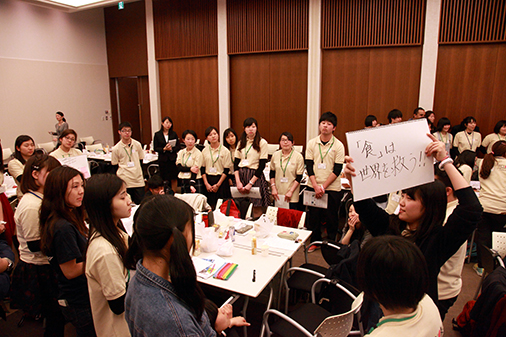
Mentors
We are indebted to the many volunteers who offered their career and life advice to the students, as well as their help in preparing presentations and leading discussions. We were honored to welcome mentors from various fields of work, as well as employees of Bank of America Merrill Lynch, a sponsor of the Global Leadership Academy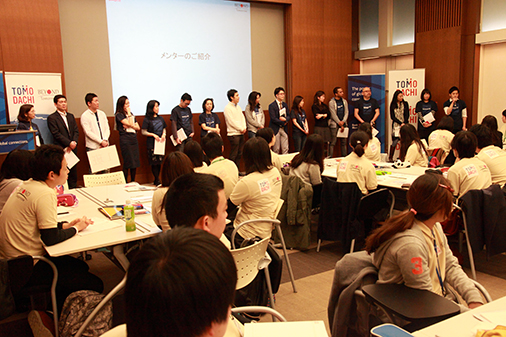
Speakers and Experts
There was an interview session during the program, where students were able to receive input from leaders of organizations active in fields related to eradicating poverty, thus aiding the students in developing their final proposals. We were honored to welcome experts from fields as varied as human rights, healthcare, and education.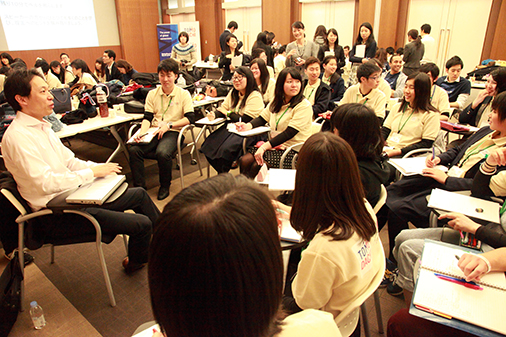
Student voices
I felt that as students, we have many things we are able to accomplish, even though we continue to be supported by a lot of people. It became clear that our strength comes from sharing the common experiences and sorrows we share — all of us from the three disaster-affected prefectures were hurt in some way, whether we are from the shore or from the inland areas. Chinatsu Watanabe 1st grade, Miyagi Daiichi High School, Miyagi prefecture
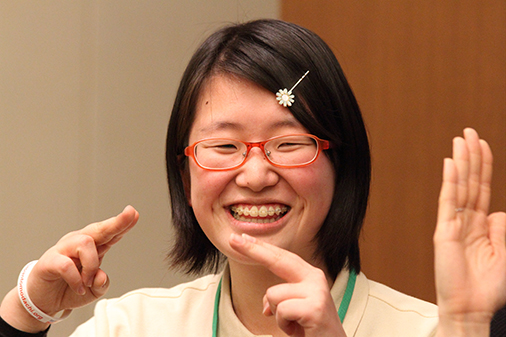
I am very proud of winning the top prize in the action plan presentation. Over the last four years, I can feel the memories of the disaster fading, and I want to make sure that I continue to communicate with other the lessons I learned from the disaster, so that they are not forgotten. Daiki Horiai 1st grade, Yamada High School, Iwate prefecture
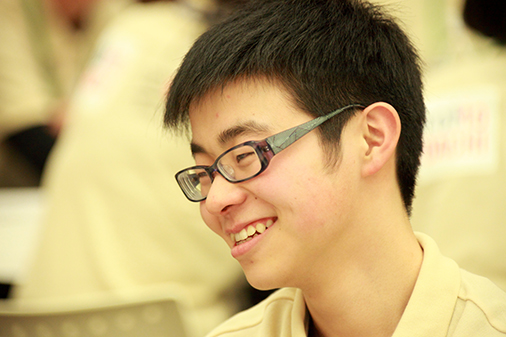
Program Outline
Main topic
“What we can do to battle global poverty”
2015 marks the target year for the Millennium Development Goals (MDGs), which summarized the United Nations Millennium Declaration, created during the United Nations’ Millennium Summit in 2000. What is global poverty, an issue that has yet to be eradicated by the target year? What is necessary for its eradication moving forward? With these questions in mind, the students were tasked to learn, discuss, and debate with each other in order to develop an action plan for the next 15 years — the so-called “MDGs 2030.” The students presented these action plans by team, and a winning team was selected by the guests of the audience and was invited to submit their proposal to the Assistant Secretary of the International Cooperation Bureau of the Ministry of Foreign Affairs of Japan.Themes
Human Rights Healthcare EducationOpening session: What is global reform? What is important to create change in the world today?
On the first day of the program, we were honored to have Associate Professor Hideyuki Inoue of Keio University lead the discussion on how to approach improving a world that has a continually increasing number of programs.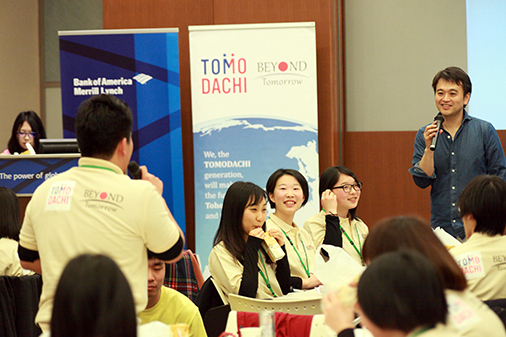
There is an intrinsic connection between the existence of “Me,” “My Work,” and the “World.” I would first like you to understand this. Once you grasp this concept, you may appreciate how meaningful our individual existence is. This is why I would like all of us to value the experiences and stories of each person around us.
“Theory of Change” — How can we change the way people feel? It is critical to understand this when attempting to catalyze a change in the world or in society. Furthermore, it is important to understand that there is a connection between inputs and outputs, as well as outcomes and beyond your initial results. I would like for you to use the things you are feeling and thinking, as well as your personal experiences, in creating change in the world.Hideyuki Inoue
Understanding the topic
In order to develop the action plans, the students first discussed the social issues in the United States they observed during their trip there. Even in a country considered to be a global superpower, there are many social issues and sufferings that its people grapple with. By using these observations as a jumping point, the students turned their focus to the world, considering issues on a global scale, and began their discussions in creating an action plan to solve these issues.It seems that the social issues afflicting Americans stem from the fact that there is a strong belief in thinking, “It’s your own responsibility.” For example, because Americans think that it’s their own responsibility to protect themselves, there is a problem with guns. And isn’t the cause of the obesity problem in the United States stemming from the fact that the citizens are charged with the responsibility to take care of their own health?
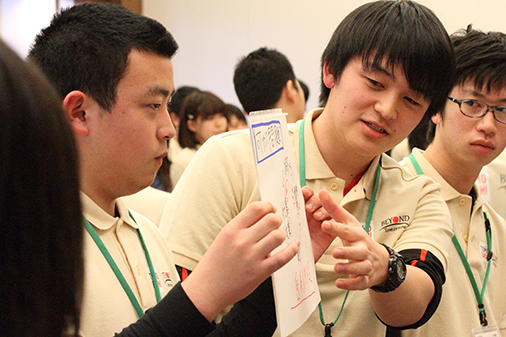

I think that many of the social issues I experienced and observed in the United States are related in a complex manner. For example, the persisting racial issues give rise to the economic inequities, which lead to the poverty issues in the country. On top of this, the problem with gun control also affects things, causing safety issues — all of these social issues are intertwined in a complex way, causing a vicious cycle.
Interviews with the experts
Human Rights issue
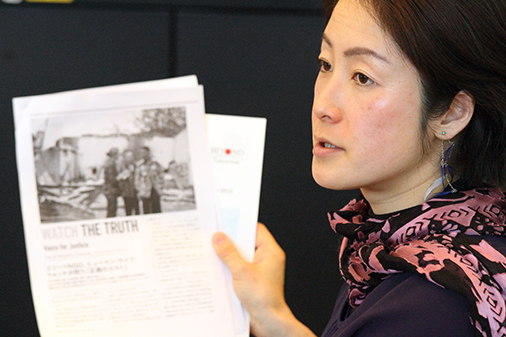
Human rights mean that a person has the right to have his or her basic dignity. Included in human rights is the right to education and the right to healthcare access. It is important to offer immediate relief to refugees in need to goods. But the human rights issue cannot be solved with an acute relief effort. The only way to truly solve it is by creating laws and changing unfit laws.
Healthcare issue
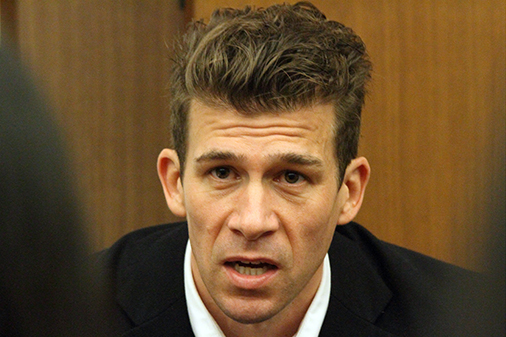
There are many people across the world who are not able to receive education. But we do not have the time to wait for a working education system to be implemented before tackling the healthcare problem. The environment is often not well managed, causing healthcare issues such as infectious diseases. It is a vicious cycle of people who want to work to get out of poverty, but the environment they live and work in is unsanitary, causing illness, making them need more money. It is necessary to right this process, creating positive cycle instead.
Education issue
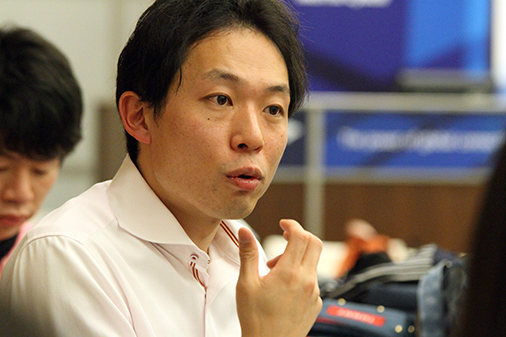
Did you know that there are inequalities in education even here in Japan? It is quoted that 20% of American children live in poverty, but that number is 17% in Japan. I want you to know that the problems exist right here, right around you, and they are not just other people’s issues. And I call on you to think: How can we fix these issues? By thinking in this way, we can begin improving society and the world.
Career night
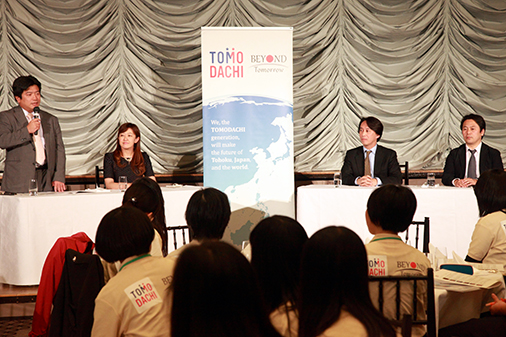
Closing Plenary
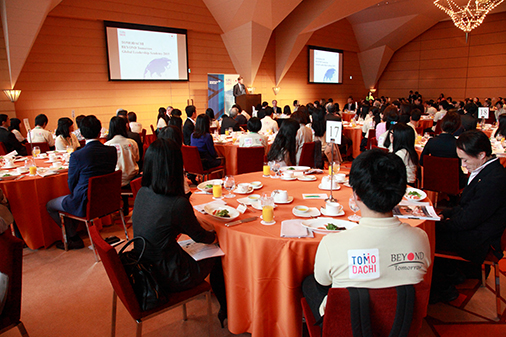
Special messages
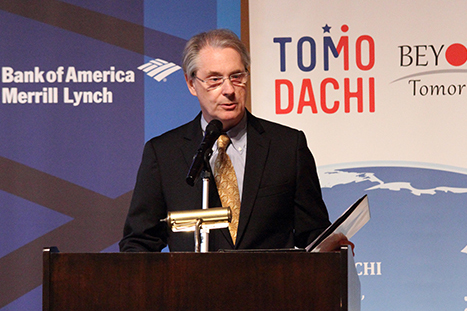
I suspect that you all engaged in a lot of discussion over the last few days concern the topic of poverty. There is great importance in the fact that you have put a lot of thought into how to approach, think about, and solve this issue. I hope that, with your participation in the TOMODACHI Initiative as a jumping-off point, you will continue to debate and discuss these topics of global significance and stay active in regional activities. My greatest wish is that these activities will lead you to a future that will be a guiding light for not only your home region of Tohoku but also for the world.
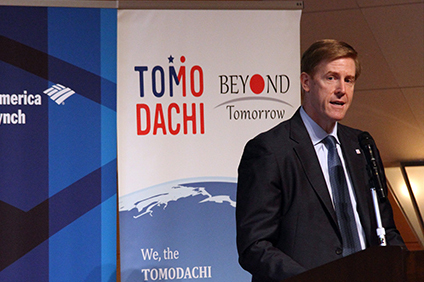
I have heard that you have spent the last two days engaging in discussion about how you can contribute to and communicate about the three themes of human rights, healthcare, and education, as well as creating presentations. I hope that you can continue to take advantage of the things you learned during your experiences abroad in your youth. It has been four years since the disaster. But the road to recovery is still long and arduous, and there is concern that memories of the disaster, as well as efforts towards recovery are fading with time. I urge you to hold on to your pure and earnest devotion, and I pray that you can overcome those trying times with grace.
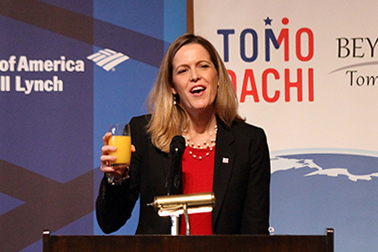
By taking just one step out of your comfort zone, you have already accomplished something: by flying to a foreign country, speaking English, and experiencing a new culture. You have thus far challenged yourself with a lot of “yes.” Participating in the TOMODACHI Program was also a “yes.” Every time you say “yes,” you open the door to a new opportunity. And this opportunity could lead you anywhere. I hope that you will continue your journey of “yes”es.
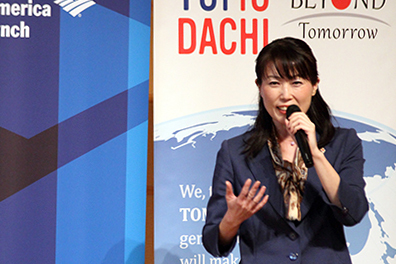
There are many problems and issues in the world, but for many of them, there are no answers — one cannot simply look in a textbook for the solution. We, as adults, also struggle with these issues. So I urge you to put your heads together in talking about the things that the world still needs, the things you think about, and the ways you think things could get better. I hope you will become someone who can learn and grow together with others. I can only imagine how challenging it must have been to even get to this point, to gather the courage to take that first step forward. I hope you know how much I respect that courage you have already demonstrated.
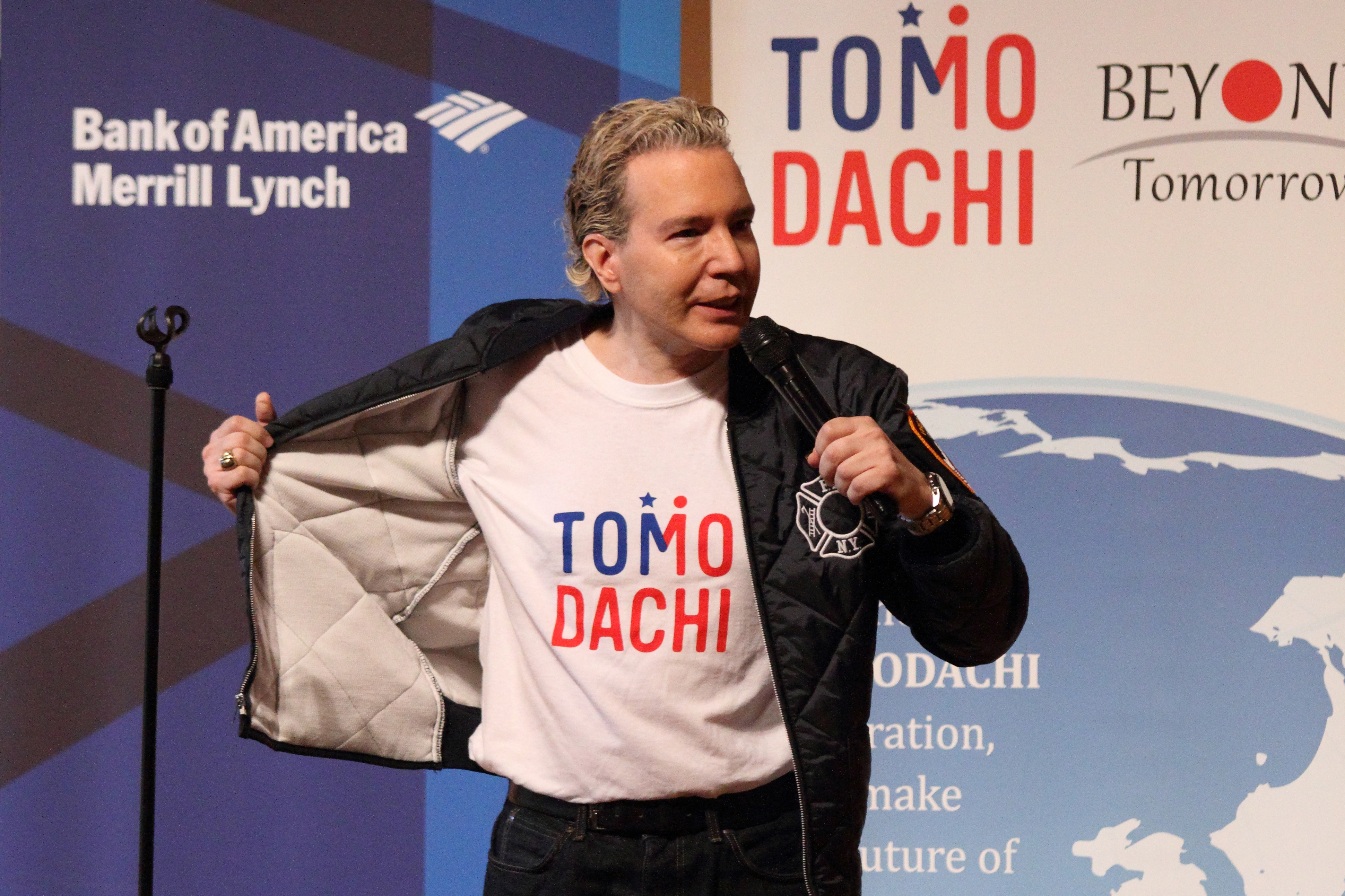
It has now been four years since the Great East Japan earthquake and tsunami. There are many problems that are arising. But it is important to not harp on the negatives. The disaster served as a spark to restart, both for young and old people. This is why it is crucial that you take advantage of this opportunity and not let it slide by. Our loved ones are watching us from above. We are expecting great things from you. And after hearing your presentations today, I have been greatly reassured. I am touched and impressed every time I come here.
Student presentations
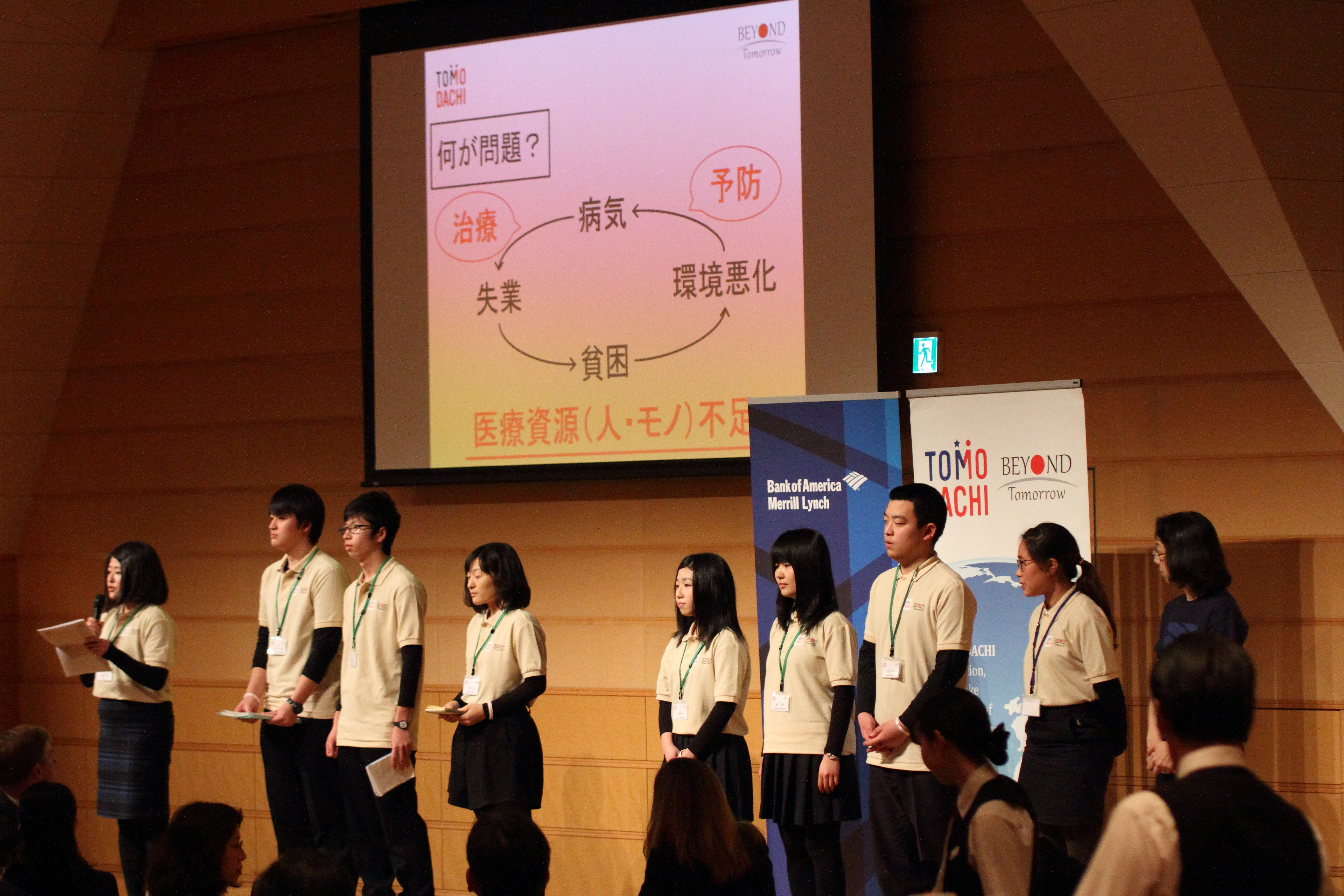
Review
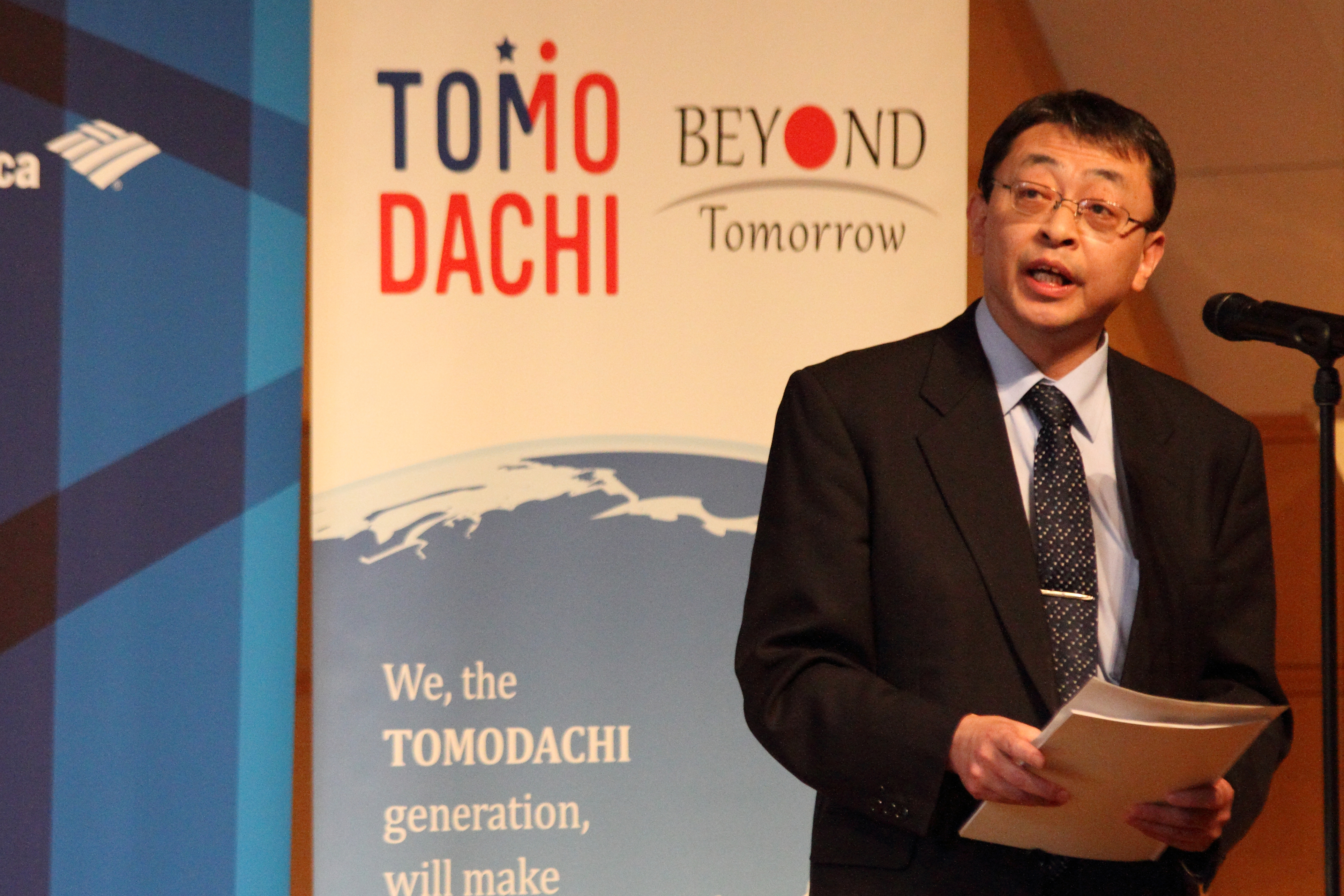
After listening to your presentations, I was struck by how much young people are thinking about the world’s connections on a daily basis. What’s more, you are not just thinking about the issues, but also thinking about how to solve them. And not just solving them, but also identifying what topics must be on the agenda to solve them by 2030. I am deeply impressed by how thoroughly you have thought through these issues. I am convinced that these are the young people who will build the society of the future.
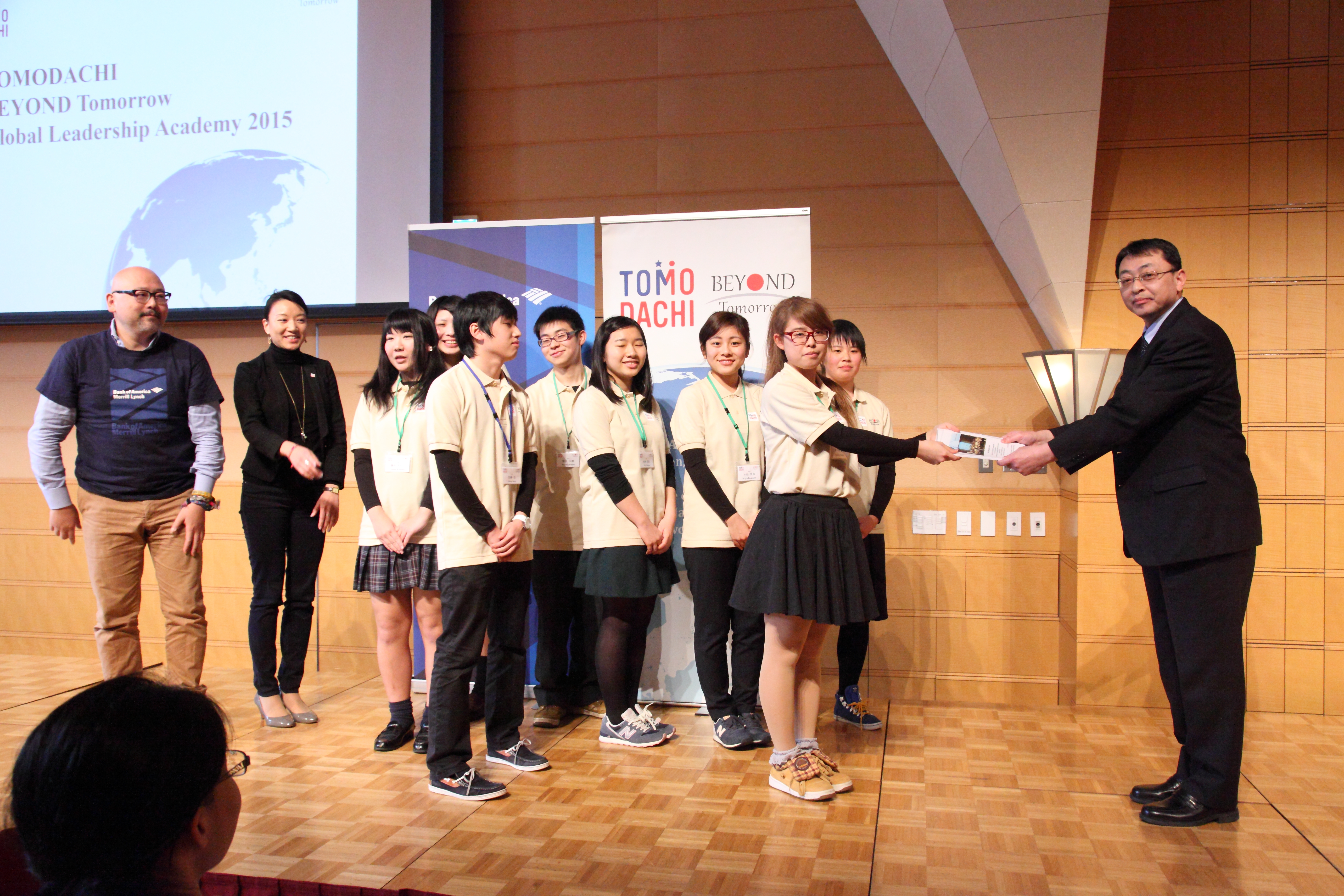
The themes that you worked with during this program — human rights, healthcare, and education — are areas that directly affect the concept of guaranteeing safety for people. I imagine you know how the current Abe administration has focused on human rights — specifically, women’s rights and social engagement. I hope that you will be able to take advantage of your experiences here at the Global Leadership Academy 2015, and I am looking forward to seeing your future involvement in the international community.
Student speech
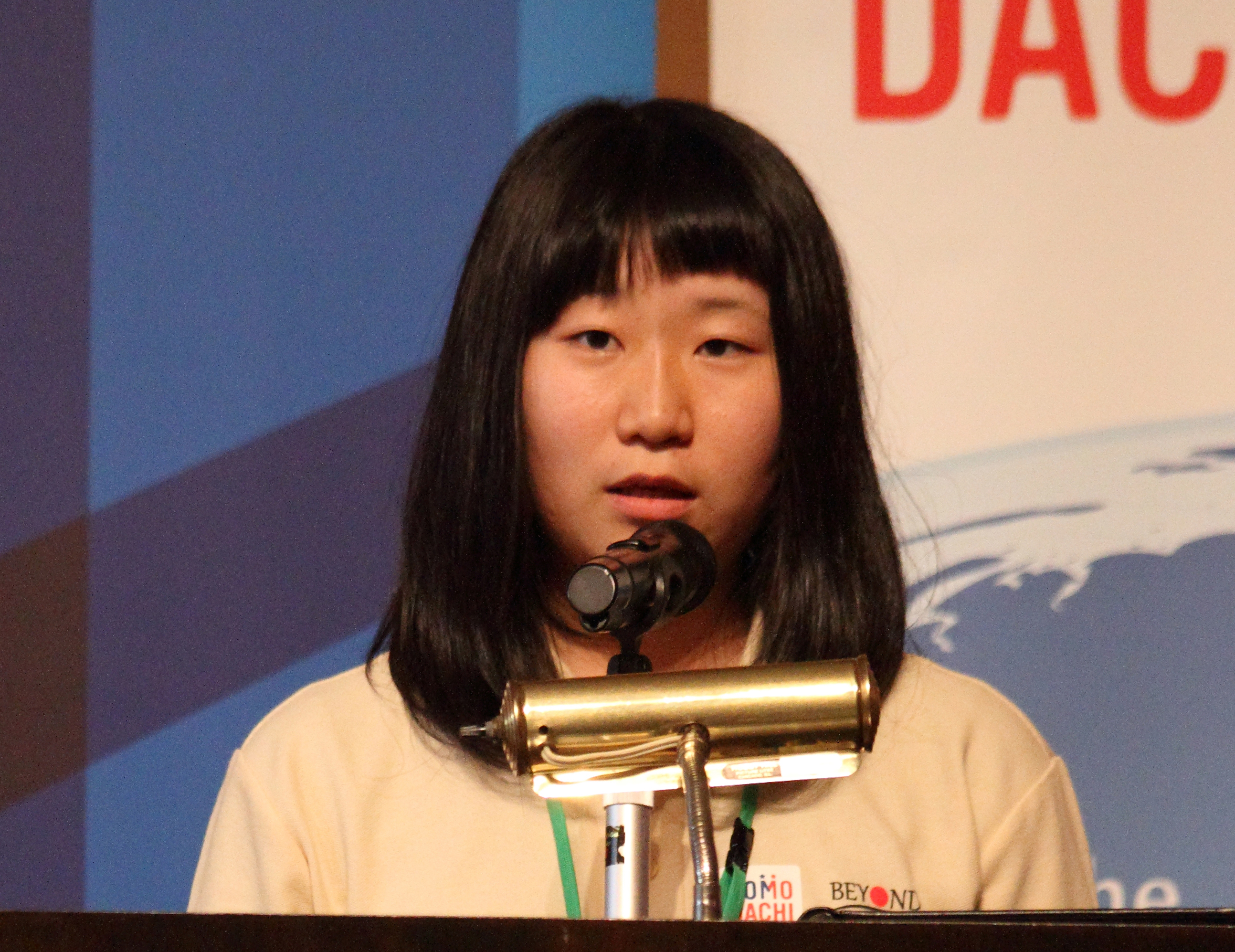
When the disaster hit, I thought everything was over. But the disaster in fact marked a new start. Had I not encountered BEYOND Tomorrow when I was in my depths of despair, I would probably still be a frog in a well who does not know the ocean. I now know the existence of the world — my ocean — and I am filled with excitement, feeling like I am so close to experiencing it myself. This is why I aim to keep taking advantage of every opportunity, meet many new people, and become someone who can contribute to the international community. To my friends from BEYOND Tomorrow. To my friends from the coast — thanks for sharing your extremely difficult experiences with me, and sharing our tears together. To my friends from the inland areas — thank you for thinking about how to empathize and work with us in deep sorrows. Seiko Abe 3rd grade, Sanuma High School, Miyagi prefecture
Closing Session
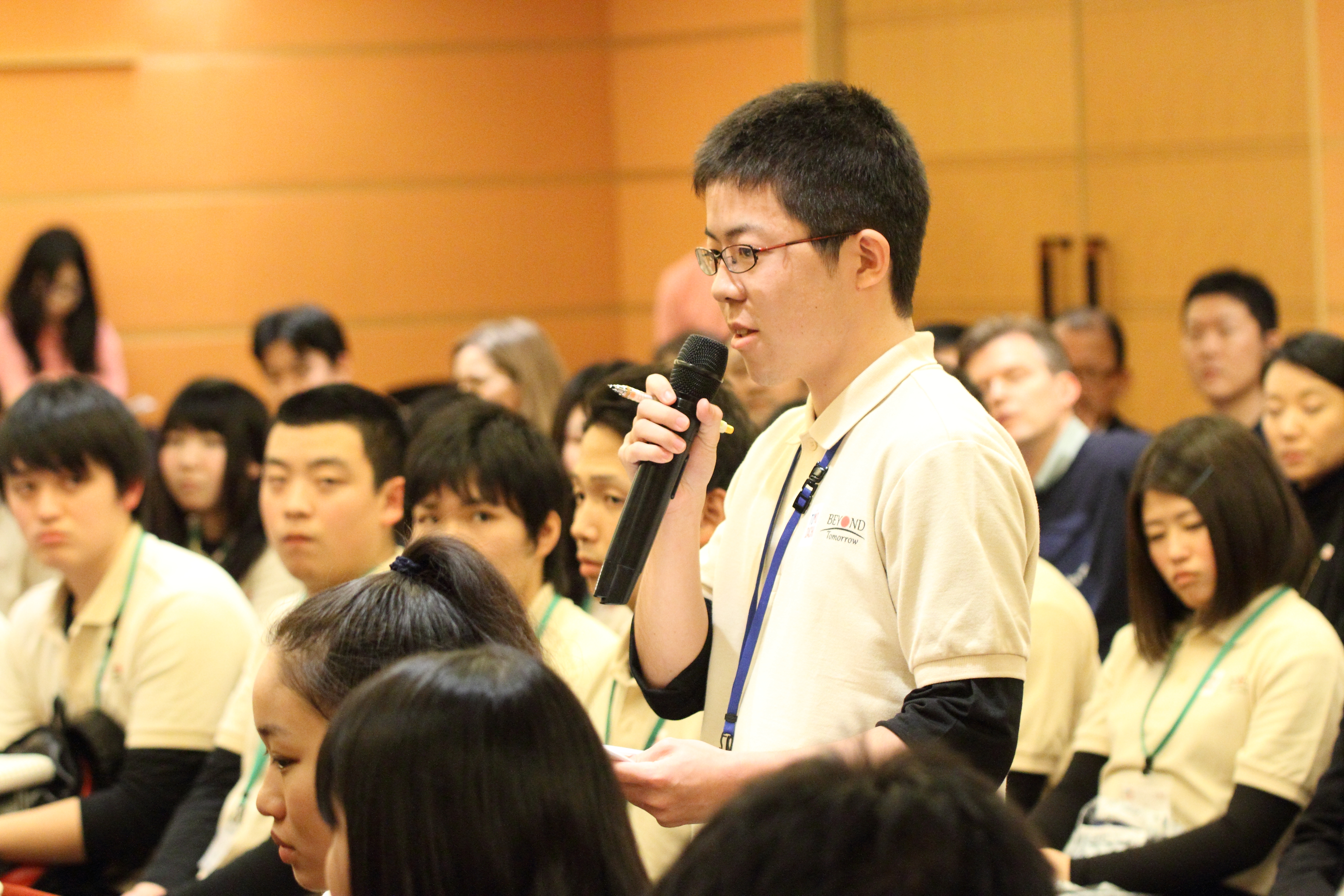
Corporate sponsor
 Bank of America Merrill Lynch
Bank of America Merrill Lynch
About TOMODACHI


